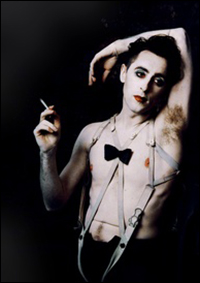
*
In the early 1990s, when director Sam Mendes began to articulate his ideas for a re-envisioned revival of Cabaret — stripping down the material, setting the story in a semi-immersive nightclub and enlisting a cast of actor-musicians — he said, "They thought I was mad!"
However, his vision was given life at the Donmar Warehouse in London's West End in 1993, where Alan Cumming — who reprises his acclaimed performance two decades later (beginning March 21 at Studio 54) — served as the Emcee, inviting theatregoers into the dark and risqué Kit Kat Klub and asking them to leave their troubles at the door.
"You see it reinvented in that way, and it's fresh, and it comes alive for a new generation — a new audience — and that's what I was seeking to do, so we went in with two ideas: It was going to be a rough theatre aesthetic [with] no mic-ing, and it was going to be set in a nightclub. So we ripped out all the seats at the Donmar, put everyone at tables and chairs [and] sold booze," said Mendes, from the downstairs lobby of Studio 54, with a laugh. "That's a key element! You get to drink! … That's how it began."
"It's an amazing journey," he continued. "Everything then moves from that central idea, which is, 'What if it's a nightclub? It's a small nightclub. It's a poor nightclub. They do everything on a shoestring.' We're going to go for some sort of social realism. People are going to make costumes out of very little. Nothing is going to look fitted or, in any way, like a costume. It will look like someone's raided the dressing-up basket. The actors will play the instruments — this was key — and essentially, it's site-specific. We had these two big ideas, I suppose, which now have become more commonplace on Broadway and Off-Broadway, which is site-specific theatre and [a cast of] actor-musicians." Mendes, whose production of Cabaret was awarded the 1998 Tony Award for Best Revival (following an acclaimed run in the West End), was one of the first of its time, and the landscape of actor-musicians (who are also proficient in song and dance) was scarce.
 |
||
| Alan Cumming |
"Now," Mendes said, "when we came to auditions [for the 2014 revival], it was fascinating. You came to audition for this 'revival of a revival' — as it were — [and] the standard of playing is astonishing because of all the John Doyle [actor-musician] productions alone… It's been wonderful to see how things have moved on, and now what's expected of performers on Broadway is not only do they [have to] sing and dance brilliantly, but they also have to be multi-instrumentalists on top of all that, and they have to act! It's been a pleasure."
But, why — after a five-year, successful run on Broadway — would Cabaret return to Studio 54 a decade-and-a-half later? Because Roundabout Theatre Company — the driving force behind the production — gave Mendes his Broadway debut.
"At a certain point, you think, 'Well, you know what, the Roundabout were very, very good to me. They gave me the chance. They tenaciously fought for what I wanted,' [so] I said, 'I'll do it for you.' In '95, I agreed to do it, but only if [they] found me a nightclub," Mendes explained. "They spent two years looking for it, and they found me what is now the Stephen Sondheim [Theatre], which then was the Henry Miller's. It was, in fact, a nightclub, and during that period — and people don't believe me when I tell them this — that was a nightclub after we closed the show every night. At 11 o'clock at night, we took down our set, and people turned up, and they danced on our set until five in the morning… and probably took a lot of drugs because we used to find syringes. They'd come in the morning, clean it up, and we'd do the show. It was chaos, but it had a crazy atmosphere, and that was the show…
"When we won the Tony Awards that night, that nightclub was open for business… It took a lot of punishment — and it had a rather nasty smell after a few weeks — but nevertheless, that was the spirit of the show, and the Roundabout fought to get that space. [When] a construction crane fell on the roof of the Henry Miller, we had to close the show, and we all thought, 'Shit. What's going to happen?' [Artistic director] Todd Haimes at the Roundabout had the balls to come and say, 'We're going to find somewhere else' and literally kick the wood off the door of Studio 54 and walk into this derelict space. I remember it very clearly — me walking in going, 'Oh my God, this is even better. This is incredible, and look at the history.' Even when you walk through the door, you see the old Studio 54 logo on there. So it is an accumulation. You can't be unaware that that mirror ball in the roof was the mirror ball under which [Andy] Warhol and [Mikhail] Baryshnikov mingled… This is Studio 54, and I loved that, and [Todd Haimes] had the balls to do that, and the show was one of the happiest experiences in my life. It ran for five years. And, when he said, 'We want to bring it back, and we need it, and we need you to do it,' I thought, 'I owe it to him.' I'm very, very fond of him, and I'm very fond of the show, and I'm very happy to be bringing it back."
 |
||
| Michelle Williams |
||
| Photo by Joseph Marzullo/WENN |
As finishing touches were being added to the set at Studio 54, where cabaret tables and banquettes filled the orchestra, Mendes seemed eager to get his cast in front of an audience and re-open the iconic Kit Kat Klub. The production, he said, is even more stripped-down than before and features a new bunch of Kit Kat Boys and Girls, who give the piece its unique and edgy aesthetic. Alan Cumming remains — still discovering, exploring and keeping Cabaret crisp.
"I love his performance, and it was very moving the first time we ran 'Willkommen.' He comes walking on stage for the first time, and I got quite choked up. I thought, 'My God… 21 years ago, I was directing this performance, and there he is,' and it's just so alive and fresh still," said Mendes with a smile. "I'm very happy to be walking into the back of the Kit Kat Klub all over again."
(Playbill.com staff writer Michael Gioia's work appears in the news, feature and video sections of Playbill.com as well as in the pages of Playbill magazine. Follow him on Twitter at @PlaybillMichael.)

















